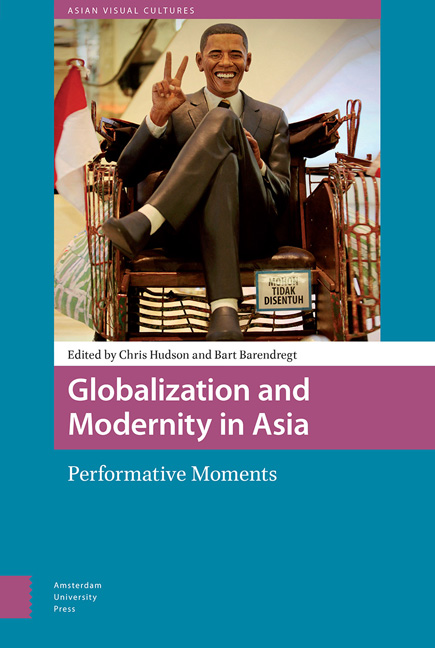Book contents
- Frontmatter
- Contents
- List of Figures
- Acknowledgments
- 1 Global Imaginaries and Performance in Asia
- 2 Globalizing the Imagination: Introductory Reflections
- 3 Weddings, Yoga, Hook-ups: Performed Identities and Technology in Bali
- 4 Super Premium Soft Double Vanilla Rich and the Ideal of Convenience in Japan
- 5 Unearthing the Past and Re-imagining the Present: Contemporary Art and Muslim Politics in a Post-9/11 World
- 6 Keeping Communists Alive in Singapore
- 7 Performative Pedagogies: Lifestyle Experts on Indian Television
- 8 Performing Cities: The Philippines Pavilion at the 2010 Shanghai International Exposition
- 9 Mobile Performance and the In-between: Yogyakarta Comes to Melbourne
- 10 An Islamist Flash Mob in the Streets of Shah Alam: Unstable Genres for Precarious Times
- 11 Pure Love?: Sanitized, Gendered and Multiple Modernities in Chinese Cinemas
- 12 Yogya on Stage
- Index
7 - Performative Pedagogies: Lifestyle Experts on Indian Television
Published online by Cambridge University Press: 11 December 2020
- Frontmatter
- Contents
- List of Figures
- Acknowledgments
- 1 Global Imaginaries and Performance in Asia
- 2 Globalizing the Imagination: Introductory Reflections
- 3 Weddings, Yoga, Hook-ups: Performed Identities and Technology in Bali
- 4 Super Premium Soft Double Vanilla Rich and the Ideal of Convenience in Japan
- 5 Unearthing the Past and Re-imagining the Present: Contemporary Art and Muslim Politics in a Post-9/11 World
- 6 Keeping Communists Alive in Singapore
- 7 Performative Pedagogies: Lifestyle Experts on Indian Television
- 8 Performing Cities: The Philippines Pavilion at the 2010 Shanghai International Exposition
- 9 Mobile Performance and the In-between: Yogyakarta Comes to Melbourne
- 10 An Islamist Flash Mob in the Streets of Shah Alam: Unstable Genres for Precarious Times
- 11 Pure Love?: Sanitized, Gendered and Multiple Modernities in Chinese Cinemas
- 12 Yogya on Stage
- Index
Summary
Abstract
In this chapter, I discuss the question of performative publics in India through examining lifestyle experts on popular factual television, in particular lifestyle and reality formats. In countries around the world, popular TV experts, from celebrity chefs to makeover gurus, have come to play an increasingly important role in promoting particular modes of life conduct, selfhood and citizenship. India has undergone dramatic social, political and economic changes in the past three decades. The emergence of these figures on popular television offers crucial insights into shifting and emergent norms, expectations and aspirations around how to live. In this chapter, I am interested in the increasingly central role and status that these popular life advisors have as cultural gurus and guides within public Indian life today and what the kinds of advice they offer and the manner in which they perform it might tell us about India’s complex social and media landscape.
Keywords: India, lifestyle television, celebrity chefs, makeover gurus
India today has a large and unruly televisual landscape. As a central and widely popular cultural institution, television plays a particularly complex role in the context of a globalized, postcolonial nation state characterized by a plurality of TV markets, publics, as well as, I would argue, ‘uses of television’ (to borrow John Hartley's phrase [1999]). In this chapter, I discuss the question of performative publics in India through examining the growing role of lifestyle experts on popular factual television, in particular lifestyle and reality formats. In countries around the world, popular figures of expertise, from celebrity chefs to makeover experts, have come to play an increasingly important role today in promoting and performing particular styles of life conduct, selfhood and citizenship, that is, in shaping the values and life practices of media publics (Lewis 2008, 2011, 2014; Lewis, Martin and Sun 2016).
One of the ways in which popular experts can be seen to function is as cultural intermediaries in Pierre Bourdieu's classic sense; that is, as tastemakers and shapers in shifting and emergent consumer markets (Lewis 2014; Powell and Prasad 2010). In the context of countries such as India they can also be seen as figures that offer ways of negotiating a variety of systems of belief and value, including secular and non-secular, individualized and collectivist ontologies.
- Type
- Chapter
- Information
- Globalization and Modernity in AsiaPerformative Moments, pp. 107 - 128Publisher: Amsterdam University PressPrint publication year: 2018



